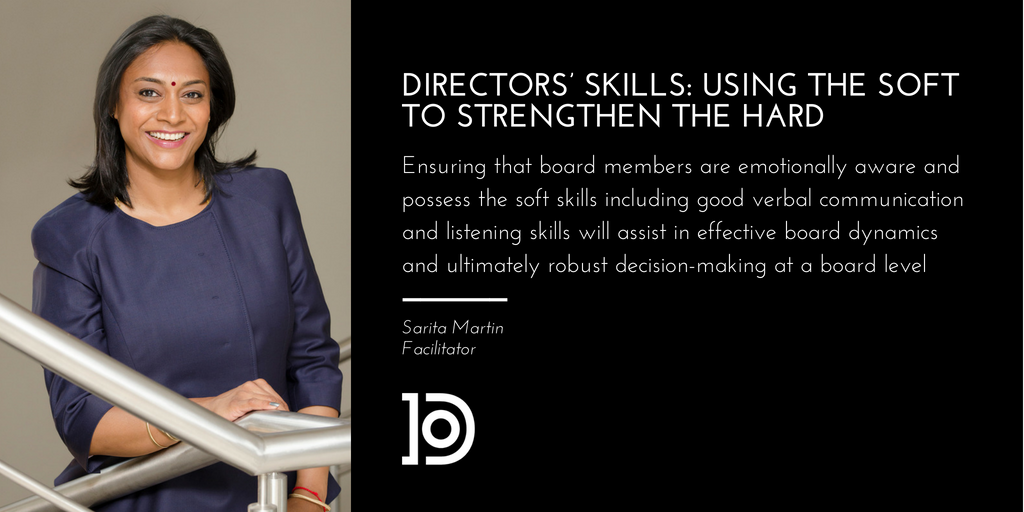|
When interviewing potential directors, nominations committees should not forget to investigate the hidden soft skills without which hard skills can prove less than useful, says Sarita Martin, a facilitator of the Institute for Directors in Southern Africa (IoDSA) and an independent non-executive director.
According to Martin there’s more to a successful board than just assembling the right skills, knowledge and experience around the table. The dynamics around the boardroom table are influenced by the individual personalities on the Board. “Boards often comprise a group of dynamic, highly accomplished individuals with strong views,” she comments. “If those individual directors are to deliver real value to their organisations through robust and productive discussions, they must have what have historically been referred to as the soft skills to operate within the context of the group, or one simply ends up with a set of individual opinions and no coherent decision.” “Board members need to have the ability to be able to present their views in a respectful and coherent manner rather than be dictatorial.” Read the room The level of in depth discussion needed at board level is only possible if directors are able to listen well and are flexible enough to engage with others board members’ ideas to come up with new insights. The courage to express one’s opinion while also engaging genuinely with other points of view is particularly difficult as today’s boards become more diverse from – among other things – a gender, age and cultural perspective. This diversity is obviously intended to provide the organisation with better visibility across the full socio-economic and political landscape, but it can mean that boards have to balance widely divergent points of views. Often it is the body language and tone of voice of individual board members rather than their words that indicates their stance on a particular matter. Replace “me” with “we” Although eliciting the views of individual board members is crucial, it is important to remember that any board decision is a decision of the collective, of the majority of board members – the “we”. An observation is that many of the new generation of board members may have no board or executive experience. In particular, they may be unaware of the protocol of board meetings, which is designed to support a non-adversarial atmosphere whilst promoting robust discussion and debate. They may also not fully comprehend that the boardroom model is not a parliamentary one: the object is not to state one’s view as forcefully as possible and then vote, but rather to interrogate an issue from all angles in order to arrive at a decision in the best interest of the company. “It’s not who gets to make the decision, but the quality of the decision-making process itself. Directors have a fiduciary duty to act in the best interests of the company, not themselves or a certain viewpoint,” Ms Martin says. According to Parmi Natesan, IoDSA Executive Director, “The personal and social competencies for directors are just as critical and the functional/technical ones. In the awarding of the Chartered Director SA designation, significant emphasis is placed on assessing these softer skills. In addition, the IoDSA has also added two new programmes to its repertoire of director training – a practical boardroom simulation experience where delegates get to practices these skills; as well as a programme providing individuals who intend to become a non-executive director with a road-map to get there” Get it right, right from the start So how do nominations committees set about establishing whether prospective directors have not only the correct understanding of how board decisions are reached, but the emotional balance and insight to handle difficult discussions in such a way as to promote the best outcome for the organisation? It’s not easy, Ms Martin acknowledges, because potential directors cannot simply be asked to take a psychometric test. However, typical interview questions can be used to probe these areas. Understanding what motivates an individual to be a director in the first place can reveal how well he or she understands the role of the board. Nominations committees can assess during discussion with candidates about the business and corporate context how able the individual is to connect the dots to see the big picture. It also necessary to determine their understanding of corporate governance and how aware they are of current affairs. Verbal communication skills, so important in a board interaction, can also be judged during an interview. “Perhaps most important of all, nomination committees should look very carefully at what candidates have done in their lives and careers. This will not only show them whether the candidate possesses the requisite hard skills and experience, but also something about how they see themselves, and how they have displayed the ‘board temperament’ in the past.” “Ensuring that board members are emotionally aware and possess the soft skills including good verbal communication and listening skills will assist in effective board dynamics and ultimately robust decision-making at a board level,” she concludes. ENDS MEDIA CONTACT: Juanita Vorster, 079 523 8374, [email protected], www.atthatpoint.co.za For more information on the IoDSA please visit: Website: www.iodsa.co.za Twitter: @The_IoDSA LinkedIn: Institute of Directors in Southern African Company Page
0 Comments
Leave a Reply. |
Archives
July 2024
Categories
All
|


 RSS Feed
RSS Feed